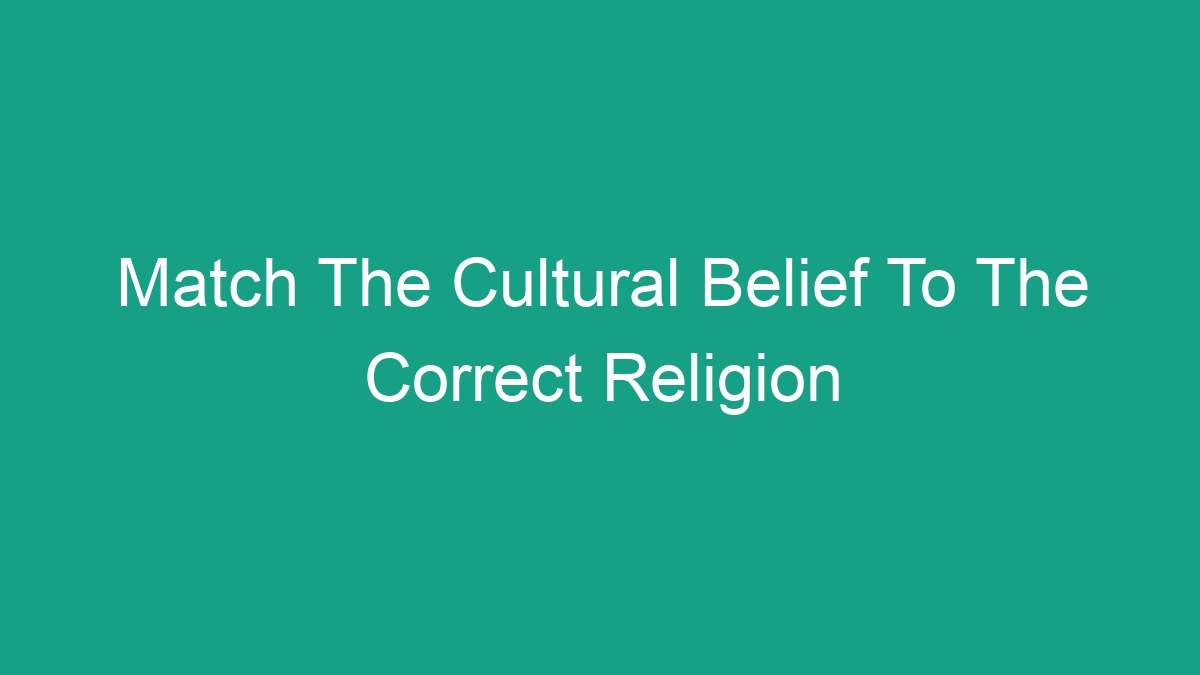
In a diverse and multicultural world, it’s important to understand and appreciate the various cultural beliefs and religious practices that exist. Different cultures have their own sets of beliefs, rituals, and traditions that are deeply rooted in their respective religions. In this article, we’ll explore some common cultural beliefs and match them to the correct religions.
1. Karma
Karma is a central belief in many Eastern religions, particularly Hinduism and Buddhism. Karma, in these religions, refers to the cosmic principle of cause and effect, where the intent and actions of an individual influence their future. In Hinduism, karma is closely tied to the concept of reincarnation, where one’s actions in this life will determine their state in the next life. Similarly, in Buddhism, the law of karma is a fundamental concept, and individuals believe that they can shape their future through their actions in the present.
2. Four Noble Truths
The Four Noble Truths are a key doctrine in Buddhism. They outline the nature of suffering and the path to liberation from it. These truths are:
1. The truth of suffering (Dukkha)
2. The truth of the origin of suffering
3. The truth of the cessation of suffering
4. The truth of the path to the cessation of suffering
This concept is specific to Buddhism and is attributed to Siddhartha Gautama, also known as the Buddha.
3. Dietary Laws
Dietary laws are prevalent in several world religions, including Judaism and Islam. In Judaism, kosher dietary laws outline which foods are permissible and forbidden according to Jewish dietary guidelines in the Torah. For example, the consumption of pork and shellfish is prohibited, and meat and dairy products cannot be consumed together. In Islam, dietary laws are known as Halal, and they outline what is permissible to eat and drink according to Islamic law. These laws are based on the teachings of the Quran and the Hadith.
4. The Great Flood
The belief in a great flood that destroyed the world is a common theme in various cultures and religions. It is notably found in the story of Noah’s Ark in the Bible, which is central to Christianity, Judaism, and Islam. In these religions, the narrative centers on a global flood that wiped out all life on earth, except for those saved by Noah and his family. Similar flood narratives can be found in other cultures around the world, such as the Mesopotamian epic of Gilgamesh.
5. The Golden Rule
The Golden Rule, also known as the ethic of reciprocity, is a moral principle that transcends many religious traditions. It states that individuals should treat others as they would like to be treated themselves. While it is not exclusive to a single religion, The Golden Rule is found in the teachings of Jesus in Christianity, where he emphasizes the importance of loving one’s neighbor as oneself. It also has parallels in other faiths, such as Hinduism, Buddhism, and Islam, where similar ethical principles are upheld.
6. The Eightfold Path
The Eightfold Path is a core principle of Buddhism that outlines the path to enlightenment and the cessation of suffering. It consists of eight interconnected elements, including right view, right intention, right speech, right action, right livelihood, right effort, right mindfulness, and right concentration. This path is specific to Buddhism and is a fundamental part of the teachings of the Buddha.
Conclusion
Understanding the cultural beliefs and religious practices of different traditions is essential for promoting intercultural understanding and respect. By recognizing the significance of certain beliefs and their corresponding religions, individuals can foster a greater sense of empathy and appreciation for the diversity of human experience.
FAQs
Q: Are these cultural beliefs exclusive to the religions mentioned?
A: While these beliefs are closely associated with the religions listed, it’s important to recognize that cultural beliefs and practices can vary within and across different religious traditions.
Q: Why is it important to match cultural beliefs to the correct religion?
A: Matching cultural beliefs with the correct religion is essential for promoting accurate understanding and appreciation of diverse cultural and religious practices. It helps prevent misconceptions and misinformation about different belief systems.
Q: Can cultural beliefs and religious practices evolve over time?
A: Yes, cultural beliefs and religious practices can evolve as societies change and develop. It’s important to recognize the dynamic nature of belief systems and their adaptability to contemporary contexts.
In conclusion, recognizing and understanding the cultural beliefs and religious practices of different traditions enriches our global society and promotes mutual respect and understanding. By learning to match these beliefs to the correct religions, we can deepen our appreciation for the diversity of human spirituality and belief systems.




